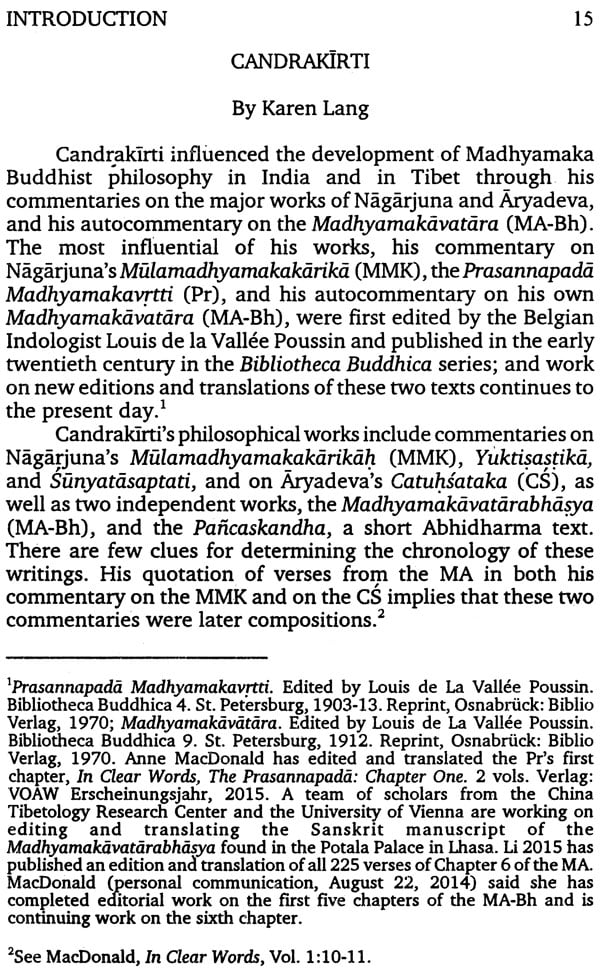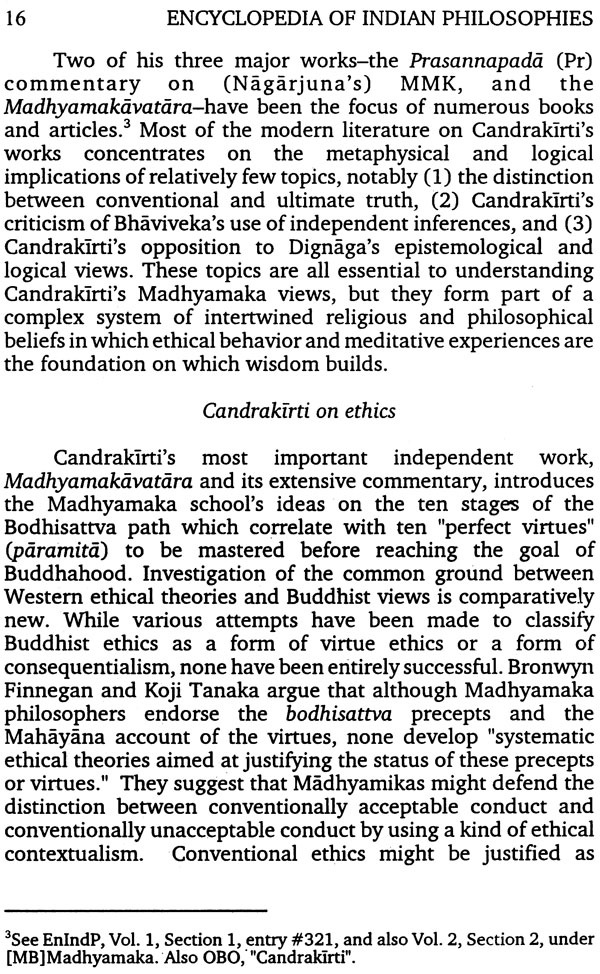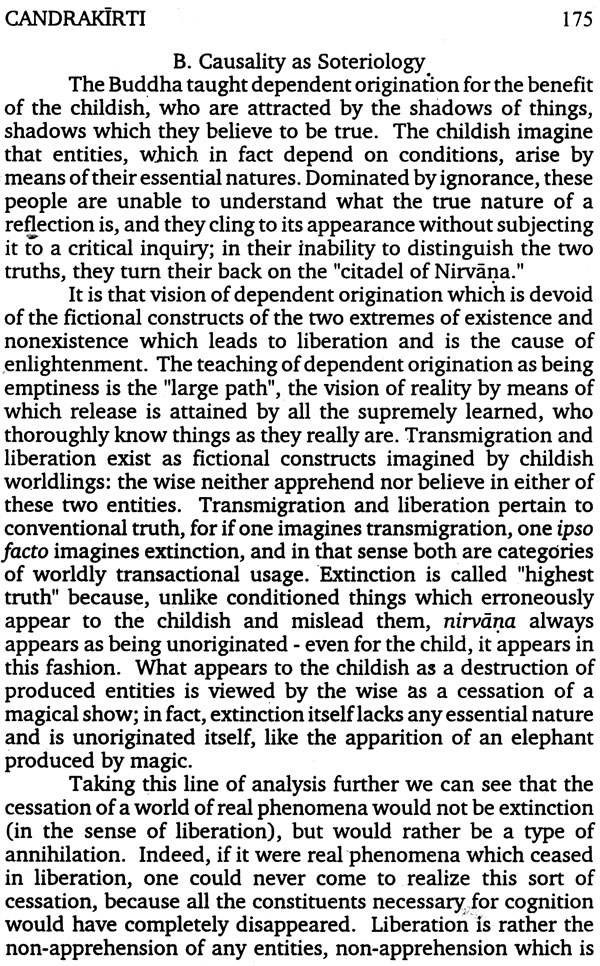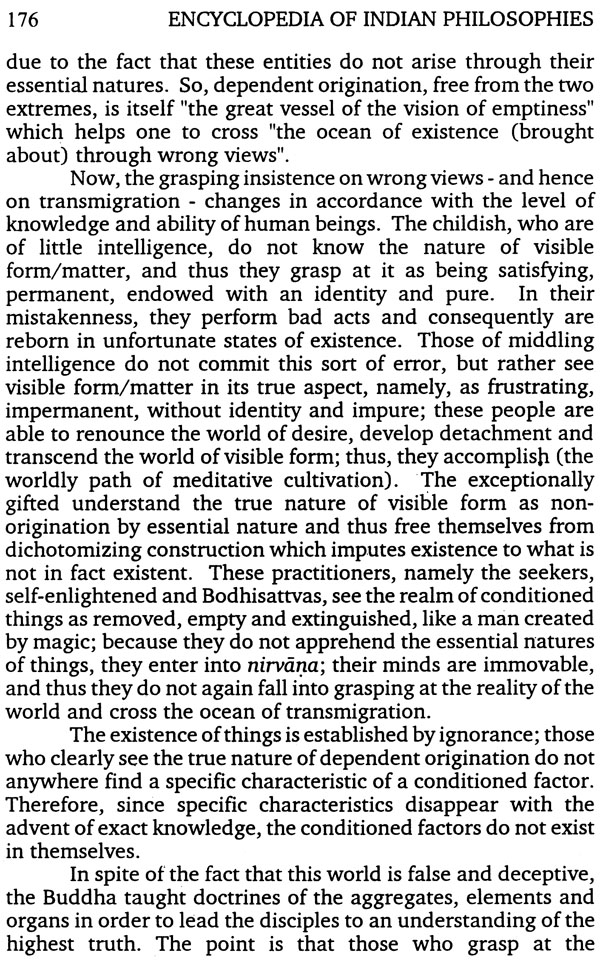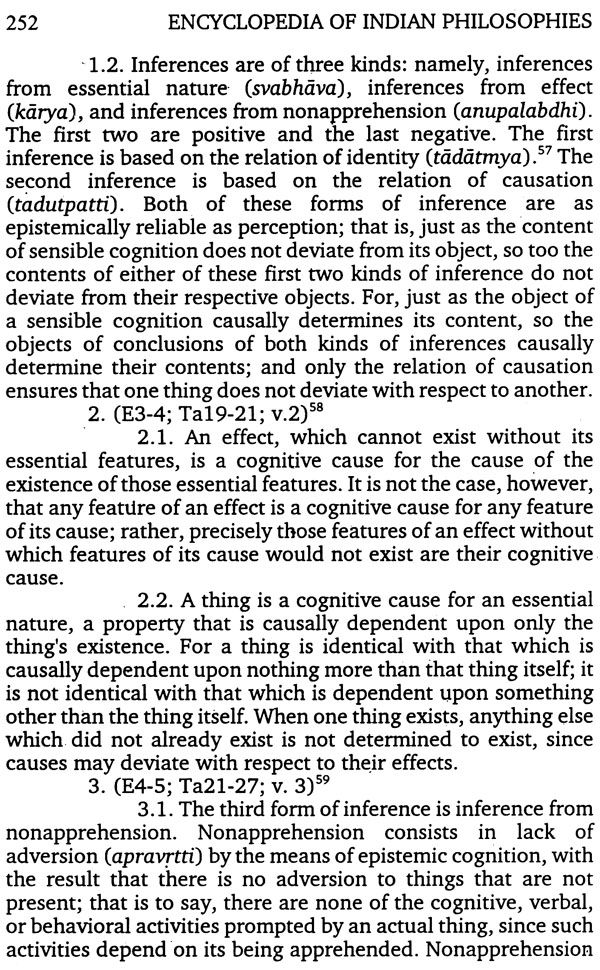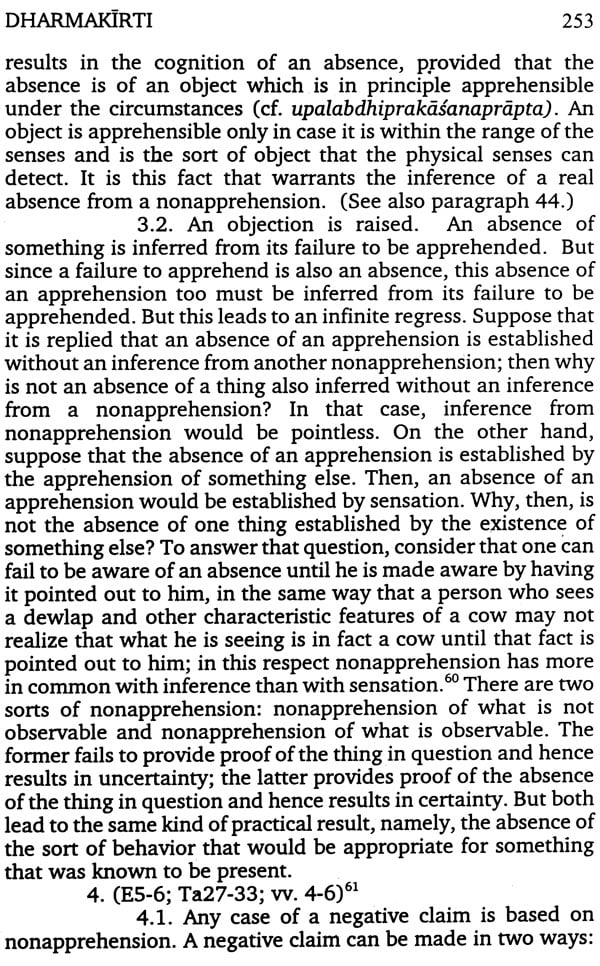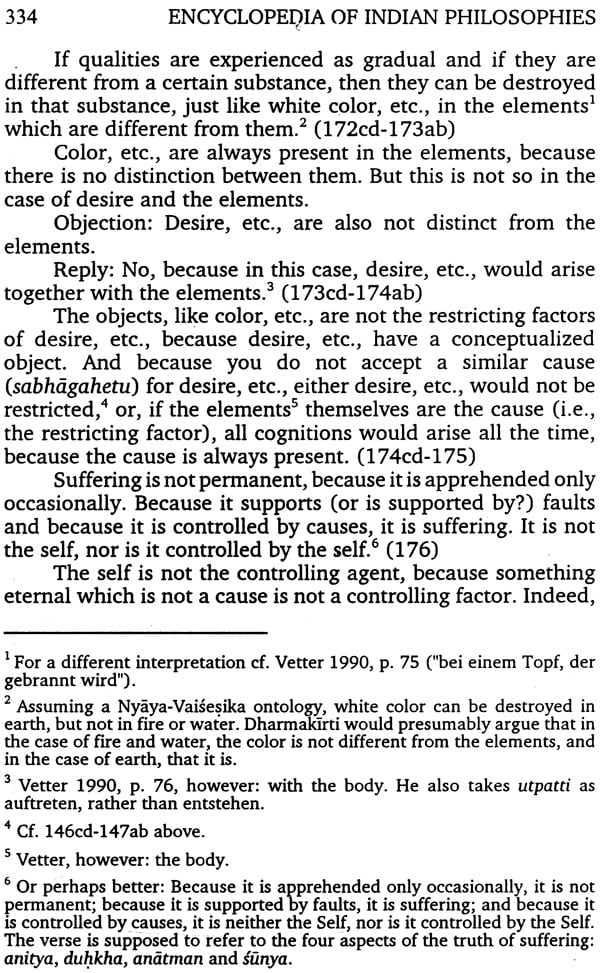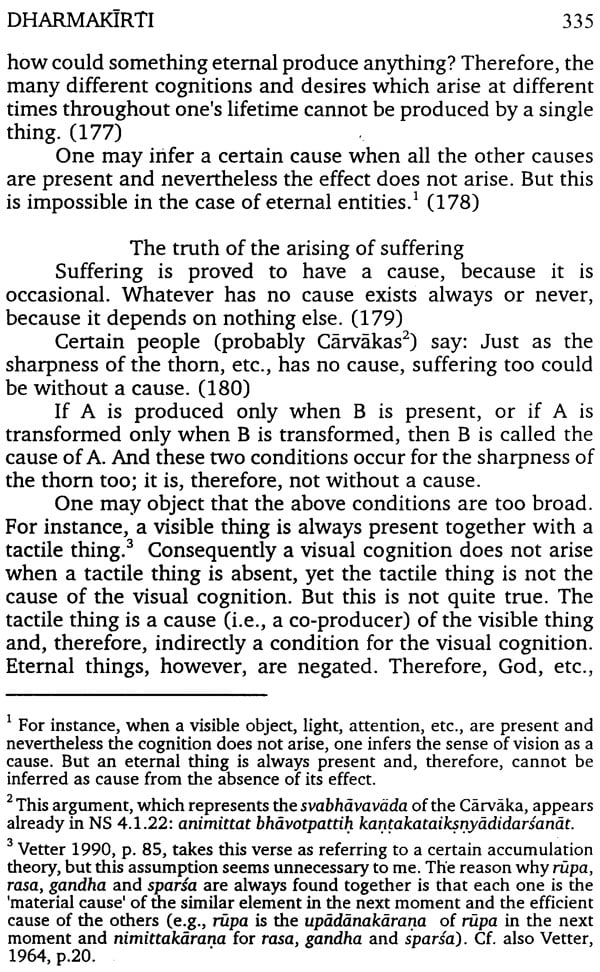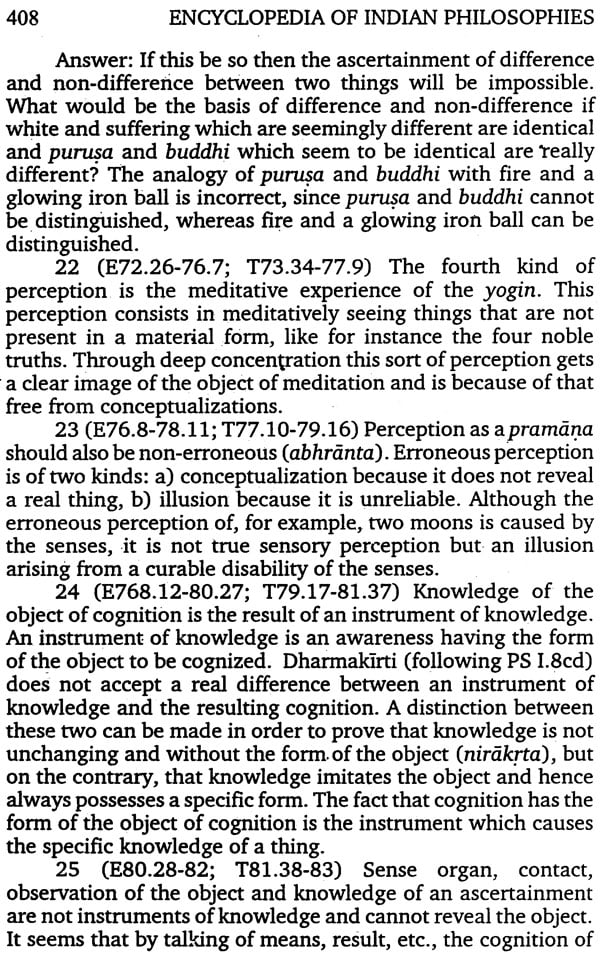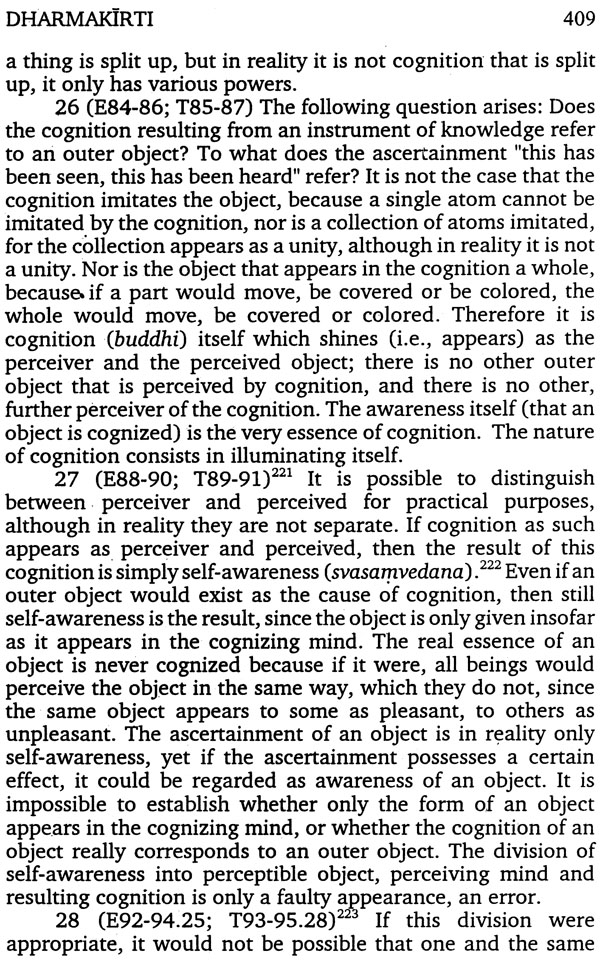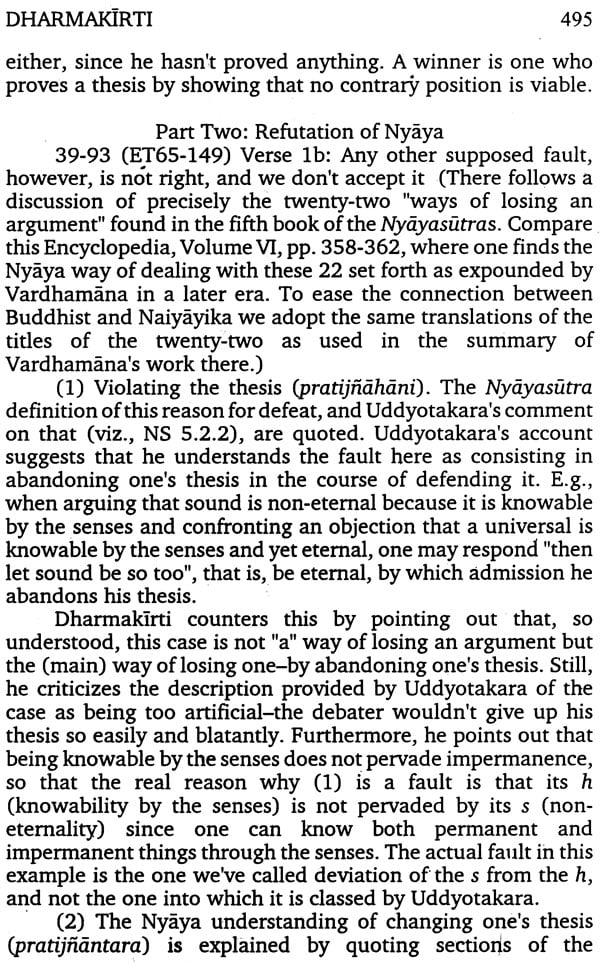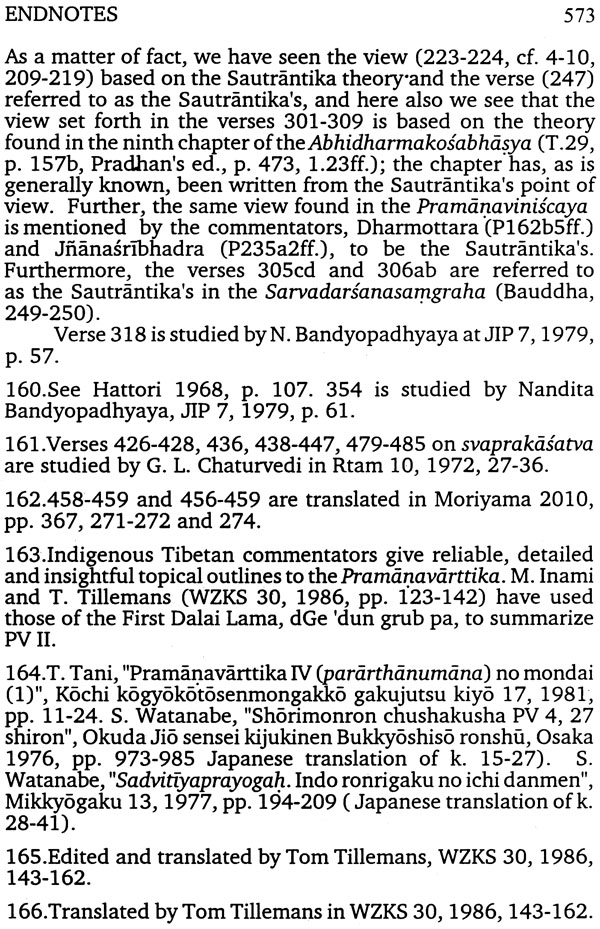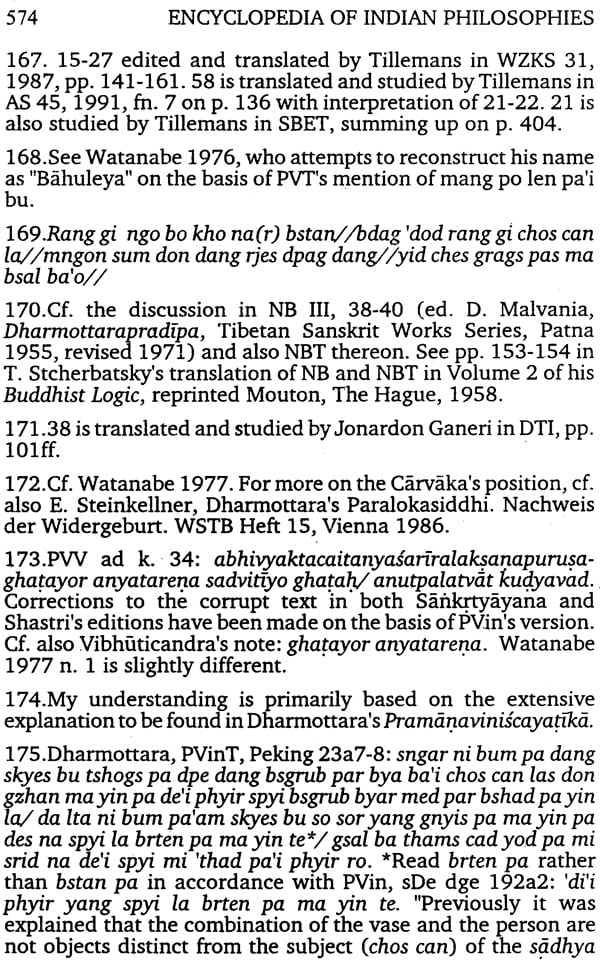
Buddhist Philosophy from 600 to 750 A.D. - Encyclopedia of Indian Philosophies (Volume XXI)
Book Specification
| Item Code: | NAN485 |
| Author: | Karl H. Potter |
| Publisher: | Motilal Banarsidass Publishers Pvt. Ltd. |
| Language: | English |
| Edition: | 2017 |
| ISBN: | 9788120841208 |
| Pages: | 664 |
| Cover: | Hardcover |
| Other Details | 10.0 inch X 6.5 inch |
| Weight | 1.20 kg |
Book Description
This, the fourth volume of the Encyclopedia to deal with Buddhist philosophers of India, focuses on Candrakirti and Dharmakirti, along with a few others who appear to have lived in the period 600-750 AD. The volume consists of summaries of these philosophers, preceded by an Introduction by Eli Franco and Karen Lang. Topics of interests discussed in both the Introduction and summaries include ontology, epistemology, soteriology, inference, causation, and (in Santideva's case) ethics.
KARL H. POTTER is Professor of philosophy and South Asian Studies at the University of Washington in Seattle, and is the General Editor of the Encyclopedia of Indian Philosophies containing 28 volumes.
Previous Volumes of this Encyclopedia have brought us from the time of the Buddha to the end of the sixth century. At this point, all the major varieties of Indian Buddhist thought have been explored-the Abhidharma view which takes the world more or less at face value within the limits of the Buddha's theses that nothing last for more than a moment, that everything is frustrating, and that there are no selves; the Madhyamaka view that there are no factors (dharma) of any sort, that takes emptiness completely seriously; the Yogacara view(s) that take(s) consciousness as the only real kind of factor, all others having only conditional existence; and the view of the Buddhist Logicians (such as Dignaga) that perhaps other factors really exist though given their nature and that of our cognition we are not able to cognize them correctly.
Adherents of all these views are to be found among the philosophers whose works are discussed in the present Volume. There are rather few Abhidharmist works contained in the Table of Contents (though this depends on some debatable assignments of dates to philosophers found in previous and subsequent Volumes). Outside of a couple of works by Prthvibandhu and Candrakirti's Pancaskandha, most of the rest of the Abhidharma works of our period are practically unknown and unstudied at the time of our writing this. Among the important writers representing the other three views-Madhyamaka, Yogacara and Buddhist Logicians-four of our authors stand out for the innovations and analyses they provide: Candrakirti, Dharmakirti, Jnanagarbha, and Subhagupta. This introduction will concentrate on the first two. Two other authors also should be noted for their important contributions to the field of Buddhist ethics, the second of whom is addressed in this Introduction: Candragomin and Santideva.
A few developments need to be noted in the period under discussion. One concerns the languages in which the materials surveyed in this Volume were written. While some are, as before, in Sanskrit, an increasing number of texts, while presumably originally composed in Sanskrit, have survived only in Tibetan, sometimes in Chinese as well. This presents an additional problem for the interpreter, who must not only guess which Sanskrit words are being translated by which Tibetan and/or Chinese ones, but also manage to do this without being overly influenced by the Tibetan or Chinese interpretations of those terms. Tibetan Buddhism developed its own "schools" of Buddhist thought; there are a number of differing Tibetan interpretations of Madhyamaka, for example, and the task of reconstructing the original Sanskrit and translating such texts takes a great deal of care and expertise. The difficulties involved in re-translating Chinese back into Sanskrit has been remarked on in the Introductions to previous Volumes.
Another issue concerns what has come to be termed "Vajrayana". That term usually is used to refer to a body of Buddhist literature which, given the assumptions governing the choice of topics covered in this Encyclopedia, does riot qualify as philosophy. In this respect it perhaps resembles Indian literature dealing with ethics and aesthetics, respected aspects of philosophy as understood in the West but relegated in the Indian tradition to a different kind of literature, given the classical Indian understanding of philosophy as moksasastra. For further discussions concerning this understanding, one may consult the Introductions to earlier Volumes of this Encyclopedia. In any case, such texts are ignored here, despite the fact that, like literature dealing with all sorts of things Indian, they may contain sections that do deal with philosophy as we here understand it. We do not try to cover everything deemed philosophical that occurs in Indian literature.
Contents
| Contributors | 5 | |
| PART ONE: INTRODUCTION | 11 | |
| Buddhist Philosophy from 600 to 750 (Kar.1 Potter) | 13 | |
| Candrakirti (Karen Lang) | 15 | |
| DharmakIrti (Eli Franco) | 51 | |
| Santideva (Karen Lang) | 137 | |
| PART TWO: SUMMARIES OF WORKS | 141 | |
| (Arranged chronologically | ||
| 1 | Prthvibandhu (600?) | 143 |
| 2 | Candragomin (600?) | 143 |
| 3 | Bahuleya (600?) | 148 |
| 4 | Candrakirti (610) | 148 |
| 5 | Dharanisamuccaya | 248 |
| 6 | Nandimitravadanasutra | 248 |
| 7 | Mandalasatra | 248 |
| 8 | Aryatathagatanambuddhaksetragunokta- | |
| dharmaparyayasutra | 248 | |
| 9 | Pratityasamutpadavibhasanirdesasutra | 249 |
| 10 | Dharmakirti | 249 |
| 11 | Prasantaviniscayapratiharya (samadhi)- sutra | 505 |
| 12 | Ghanavyuhasutra | 506 |
| 13 | Manjusripariprcchasutra | 506 |
| 14 | Tathagatapratibimbapratisthanasamsa- sutra | 506 |
| 15 | Srimatibrahmanipariprcchasutra | 506 |
| 16 | Parimitagunanusamsadharanisutra | 506 |
| 17 | Avalokitavrata (650?), Prajnapradipa-Tika | 507 |
| 18 | Dirghanakhaparivrajakapariprchasutra | 507 |
| 19 | Sarvatathagatadhisthanasattvalokanabuddha- | |
| ksetrasandarsanavyuharaja (dharani) sutra | 507 | |
| 20 | Bhadrokaratrisutra | 507 |
| 21 | Anityatasutra | 507 |
| 22 | Catuskanirharasutra | 507 |
| 23 | (Rasmi)Vimalavisuddhaprabhadharanisutra | 508 |
| 24 | Ekaksarabuddhosnaka (?) | 508 |
| 25 | Sarvadharmagunavyuharajasutra | 508 |
| 26 | Ksitigarbhapranidhanasutra | 508 |
| 27 | Caityapradaksinagathasutra | 508 |
| 28 | Arsaprasamanasutra | 508 |
| 29 | Trisamvaranirdesasutra | 508 |
| 30 | Anantamukhaparisodhananirdesa- .parivartasutra | 509 |
| 31 | Aksobhyatathagata(sya)vyuhasutra | 509 |
| 32 | Varmavyuhanirdesasutra | 509 |
| 33 | Rasmisamatamuktanirdesasutra | 509 |
| 34 | Mahapratiharyanirdesasutra | 509 |
| 35 | Adhyasayasancodanasutra | 509 |
| 36 | Gangottarapariprcchasutra (Chang) | 509 |
| 37 | Gunaratnasamkusumitapariprcchasutra | 512 |
| 38 | Acintyabuddhavisayanirdesasiura | 513 |
| 39 | Darikavimalasraddhapariprcchasutra | 513 |
| 40 | Nilakantha(ka)sutra | 513 |
| 41 | Devendrabuddhi (670), Pramanavarttika-Panjika | 513 |
| 42 | Susiddhikarapujavidhi | 514 |
| 43 | Mahabalavajrakrodhasutra | 514 |
| 44 | Srigupta (689), Tattvavataravrtti (Ruegg) | 514 |
| 45 | Asvabhava (690), Alokamala-Tika | 516 |
| 46 | Santideva | 516 |
| 47 | Aryasura(700), Paramitasamasa (Meadows) | 525 |
| 48 | Jayaraksita (700), Sphutartha-Srighanacarasamgrahatika | 530 |
| 49 | Sarvatathagatatattvasamgrahasutra | 531 |
| 50 | Sakyabuddhi (710), Pramanavarttikapanjika-Tika | 531 |
| 51 | Gaganaganjapariprcchasutra | 531 |
| 52 | Usnisacakravartitantrasutra | 532 |
| 53 | Jnanagarbha | 532 |
| 54 | Subhagupta | 548 |
| 55 | (Bhatta) Arcata (740), Hetubindu-Tika (Sanghvi) | 555 |
| 56 | Jinendrabuddhi (745), Pramanasamuccaya- Visalamalavati | 557 |
| ENDNOTES | 559 | |
| BIBLIOGRAPHY AND ABBREVIATIONS | 595 | |
| GLOSSARY-INDEX | 617 |
Sample Pages
